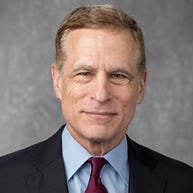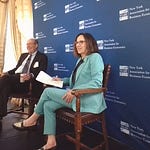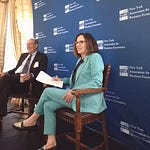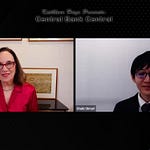Rob Kaplan has spent many years with his feet at different times in the world of central banking and the world of Wall Street, as President of the Federal Reserve Bank of Dallas and as Vice Chairman of Goldman Sachs. As such he brings a lot of perspective, experience, and critical thinking to the table when he offers his analysis of the Fed’s latest pause in interest rate cuts which has left so many wondering what the Fed does next and what will drive it.
He is adamant that the Fed has done enough rate cutting for now. He doesn’t push back when I ask why if it makes sense for the Fed to keep cutting rates when many economic indicators including the last retail sales number and the Atlanta Fed’s GDP Now Index points to a 2.9% GDP increase in the first quarter of this year . For this it is still the fiscal tailwinds from the Covid-driven programs like the Inflation Reduction Act that are still blowing strong.
With this in place and so much uncertainty about how President Trump’s policies will play out Rob is 100 percent certain about what he would do if he were at the Fed. “I would do nothing” and take no action at all until there’s a definitive inflation will continue to fall. Clearly he’s far from convinced rate cuts should be in the works now.
So dive in and hear, see what Rob has to say. And what he sees next for tariffs, energy policy, the fiscal deficit, education and much more.
Kaplan pretty well nailed the Fed- 00:00:53.04 --> 00:01:14.20
I felt that they could do as much as 100 to get to 4 and a quarter 4 and a half, I must tell you. By the time we got to the December meeting, and you heard me say this, I probably would have not acted in the December meeting, but I don't think it's the end of the world. felt that inflation, progress, was likely to actually go backwards a little bit. In other words, the forward estimates of inflation had sort of stalled out. When I saw that forecast along with my own, I probably would have said, I think it's better to pause here…
Strong Growth Rationale?? Fiscal, Fiscal! 00:02:10.06 --> 00:02:28.15
…not everyone would agree with me. But my own view has been very strongly, and you've been hearing me say this now for a couple of years. I think one of the reasons why growth is so strong is historically stimulative fiscal policy, and you've heard me say it ad nauseum over the last 2 years…. Fiscal policy is blunting to some extent monetary policy.
Fiscal shift coming 00:03:02.19 --> 00:03:36.22
You're going to see that fiscal approach shift. It's already starting, and it's going to be more jarring. Inflation, reduction act disbursements have been frozen.
If you were there, what would you do next? 00:04:09:02 - 00:04:40:01
I would do nothing. I would feel strongly that I need the bar now. We did our 100 basis points of cuts, now, especially - in light of the restructuring going on and the fiscal tailwind that's already in the pipeline - you can't undo. I would feel strongly that we should take no action at all until we see demonstrable evidence of a continued disinflation process.
Tariffs: a debate over the effect and also over the policy- 00:05:49:07 - 00:06:17:24
...as to what Rob Kaplan thinks… I don't know what they're going to do yet. So, one type of tariff is not the same as another type. What I mean by that, we don't know what tariffs are ultimately going to be put on. There are lots of threatened tariffs right now, including for three days last weekend, Colombia was threatened with tariffs. And three days later, they're off. So so what I'm watching to see is what we ultimately do.
Tariffs on Mexico and Canada are a complication for US firms 00:06:18:04 - 00:06:44:18
… I may be delusional, but I'd be very surprised and scratch my head if they put those tariffs on and here's why. As opposed to look back and say, well, they wanted more work on immigrants and fentanyl and it was a negotiating tack. And here's why. It's very hard to induce U.S. companies to expand U.S. manufacturing if they don't have the ability to source intermediate goods from Mexico and to a lesser extent, Canada. And so if you want to and you want to induce more manufacturing here, you sort of undermine that by putting tariffs on Mexico and Canada
Deportation…too broad of a brush? 00:07:11:04 - 00:07:32:14
Deportations is a is is the big question on that. Are we going to just deport criminals, which I don't know. 300,000 to 400,000 workers right now. I can tell you many places of business in construction and agriculture. The CEOs are telling me half my workforce is not coming in because they're afraid. They don't know they're not criminals, but they're undocumented and they don't know whether they're going to be raids
Trump team focused on getting energy prices down 00:08:39:06 - 00:08:53:00
They're going to try<to increase drilling>. And by the way, it's more that they'll induce more drilling, although the industry, as you and I have talked, is a lot happier to drill in the high seventies, and he wants prices down into the sixties. There's going to be a moment of truth coming up here in the next several months. But he's also going to make it easier to have transmission pipelines to run a refinery. He's going to try to improve the whole ecosystem, to lower the price at the pump. And they are they're hell bent, for lack of a better word, intent on doing it.
Dead serious on deficit reduction 00:09:43:22 - 00:10:07:14
So let me tell you what I know and what I don't know. What I do know, is the parties involved are dead serious, dead serious about wanting to take deficits from you - pick it - six and a half to 7% of GDP down to closer to, I don't know what, five percent, you know, whatever they're going to, they're dead serious.
Jarring Dislocations ahead- 00:10:07:14 - 00:10:32:11
The issue is can they? But so all these jarring freezes that people are reacting to over the last week, we expected those. And there's going to be more if you want to cut government spending, it's going to be jarring. And some of the things that we've relied on for years and years and years are going to go away.
Tax policy is more ‘extend’ that make deeper cuts- 00:10:53:22 - 00:11:18:10
So I think they'll extend things. They're already existing. I would guess the bar, I would guess, but I don't know are going to be is going to be very high to do more than that, because I think people in Congress and in the administration are worried about the term premium, our inability to sell duration and want to see deficits as a percentage of GDP improve.
It’s all connected fiscal fears and duration- 00:12:33:17 - 00:13:02:08
I think that if you improve the fiscal situation, it'll likely it'll people will be more willing, I believe. And when I talk to investors and big institutions, it's not that they don't want to buy duration, they run big funds, they have to buy some duration. But but, but they want a higher yield to do it. If they saw real fiscal discipline, I think you might see people on the on the margin be more willing to buy duration.
Path to success or the road to perdition? 00:13:35:18 - 00:14:25:21
Sure. It's, I think, still with these changes <that> are intended to be net-net-net disinflationary. However, you got to get the workforce right. You need workforce growth and you've got to make good decisions on tariffs and I don't know what they're going to do on both those. But if they make it, if we have good workforce growth and if you leave a North American corridor open to allow companies to outsource to Mexico and Canada, I would be more optimistic that with the regulatory changes, the energy changes, the fiscal changes that actually they will be contributing positively to the path of inflation.
A divided Fed and …divided THEY STAND! 00:15:17:04 - 00:15:44:13
Now, the division I see <on the FOMC>… is personally, I think… natural. I'd be pretty concerned if there weren't divisions, because… why? I don't know what the impact is going to be of these structural changes. I would hope my colleagues would have varying views on this. And but I think they can go though <it>. They're more aligned than it may appear.
Inflation and inflation expectations and pending policy 00:16:53:21 - 00:17:53:19
One, the energy transition… globally it’s expensive and is on the balance, increases costs. Historically high fiscal spending is not; I think it creates more labor pressure. I think fiscal discipline is disinflationary. Regulatory overhaul is disinflationary. Relooking at the energy ecosystem is disinflationary. So you can imagine where consumers are watching this back and forth and they're not sure what to think. But they see we've had historically high fiscal spending and set <high> and service sector expenses and wages and rents. You know, costs are sticky. And so I think those expectations may well change based on the package of decisions that are being made now. And so I'd I, I'd say the jury's out based on what we do.
Education, workforce growth, Productivity - 00:18:14:09 - 00:19:16:04
The United States, whether we like it or not, workforce growth is decelerating. It's down to close to zero before immigration. Productivity growth, therefore, is key. When I look at the labor force and I see early child literacy, especially in at risk areas, disappointing educational attainment of 15 year olds, lagging the world, skills training uneven...If we want to improve productivity, growth, education is central to that because why when a worker, who drive a car, loses his or her job <to AI>, they then have to get reposted and retrained more, the more literate they are the easier these are to do. The more they have access to skills training, the easier it will be to do, and that's that next job they take that will determine whether we get and how much productivity benefit we get from the driverless car <and other technology dislocations>.
Education! 00:19:16:09 - 00:19:39:15
Education is key and the reason I keep talking about it, if you want to deleverage, if you want to grow, you want to achieve all these objectives, we need better educational attainment and investment in education. So I keep saying it, and I think the private sector is going to have to pick up the slack. But but I hope the policymakers will also recognize this.
Rob Kaplan
Rob Kaplan is Vice Chairman of Goldman Sachs and a member of the Management Committee. Previously, Mr. Kaplan served as President and CEO of the Federal Reserve Bank of Dallas. Before joining the Fed, he was the Martin Marshall Professor of Management Practice and Senior Associate Dean at Harvard Business School (HBS).
Mr. Kaplan initially joined Goldman Sachs in 1983 and became a Partner in 1990. In 2002, he became Vice Chairman of the firm with global responsibility for the Investment Banking and Investment Management Divisions. He also served as Co-Chair of the Partnership Committee and Chair of the Goldman Sachs Pine Street Leadership Program. In 1998, Mr. Kaplan became Global Co-Head of Investment Banking and a member of the Management Committee. His previous roles included serving as Head of Asia Pacific Investment Banking, Co-Chief operating officer of global Investment Banking and Head of the Americas Corporate Finance Department.
Mr. Kaplan retired from the firm in 2006 to join HBS, becoming a Senior Director at that time.
Mr. Kaplan is Chairman of Project ALS and Co-Chairman of the Draper Richards Kaplan Foundation. He is a board member of Harvard Medical School and St. Mark’s School of Texas, and is a member of the George W. Bush Institute’s Advisory Council. He is also an Advisory Board member of the Baker Institute. He serves on the Bipartisan Policy Center President’s Council and on the Board of Directors at The Holdsworth Center.
Mr. Kaplan is the author of three books on leadership, What You Really Need to Lead, What You’re Really Meant To Do, and What to Ask the Person in the Mirror.














Share this post